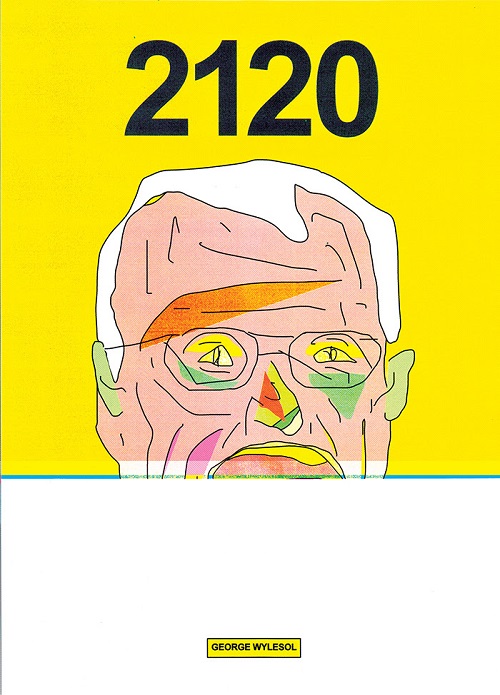*Ed.’s Note: click image to view larger size.

Called a printed “point and click escape game,” George Wylesol’s new comic, 2120, shows how the influence of interactivity continues to exert itself in narratives, even on the page. Taking its form as an analog video game in the style of Choose Your Own Adventure, the book opens with the note that you “control” the protagonist, shaping how Wade Duffy, a 46-year-old technician in Aberdeen, Maryland, searches a seemingly abandoned office space.
As the player, avatar, or character Wade, we browse through the building at 2120 Macmillian Drive, looking for the computer he’s to fix. By simulating this illusion of movement through the fictional physical location, each page frames the space. The limit to these full panels makes the imaginary space outside of what is revealed even more intriguing. Each flip acts as a camera lens, or peephole, which lends itself to the discovery and mystery of the story.
Without giving too much away (since the exploration is part of the fun), 2120 might have more in common with episodes of The Twilight Zone or Jim Henson’s The Cube than printed counterparts like C. F.’s William Softkey and the Purple Spider, also a techno-interested graphic work. Depending on the choices made, we arrive further into the guts of the building. Wade gets increasingly desperate to find the job he was tasked with or to leave and go home. He frequently comes across torn papers that slowly reveal more information. He sees a date that reads 1996; later, some memos from 1993 and 1994. There are indications of a project starting in 1991 and the acronym DAC, which stands for the Division of Advanced Computing, a U.S. Army Research Laboratory.
A scrap informs about someone named “Fountain” pleading guilty, and protesters gathered outside the trial. In another room, it’s revealed that Fountain became disillusioned with the U.S. Army and their attempts to weaponize the technology he was developing. Like Stranger Things or Severance, it appears as if an entirely new genre of works is being created that grab some of their inspiration from the Wikipedia entry for Project MKUltra.
As Wade continues to move room to room and hallway to hallway, many of his options rest on finding passwords and access codes, a device that at times can feel repetitious. Although, in a time of vacant commercial real estate and populations of remote workers, the eerie empty office makes for appropriate archeology.
One of the fascinating aspects of reading first-person as Wade is how it reduced the labor of drawing figures and not having to repeat human faces and expressions for Wylesol, something many artists have commented on as arduous and time-consuming. (Ernie Bushmiller’s series of Nancy comic strips on Labor Day, which hides her face and figure, are some of the more elegant and humorous expressions of this.)
By leaning into the minimal and fast in a story focused on work, the labor conditions of our time are revealed. 2120’s production, perhaps, tells as much as the plot does. Requiring a Kickstarter-funded publishing campaign in which its author had to find creative solutions for how much unique effort it would require, speed and digital proliferation were essential. We’re all quite exhausted at this point, aren’t we?
At a certain point in this graphic novel with little text, shadows are made out of numbers and letters, a nice effect. A static box overtakes a figure reminding us that there are digital parameters to the depiction of physical space. There are distorted figures and faces in this unnatural environment where a person can be plugged in or drained through cables. There’s an aspect of forgetting at play where amnesiac characters appear increasingly untethered from the larger world.
In a time of big data, when our digital overlords may know more about our habits and patterns than we do, the unnerving quality of our main player having so much of him concealed from himself rings true. Just as Wylesol’s aesthetic comes from the photocopied and printed, there’s the indication of monstrous forces that extend that same sensibility to people as duplicates and repeats. The blurring between the artificial and the human in a time when everything is electronically mediated and watched may be good for AI, but not necessarily for us.
While the job reveals a promise to give him everything, what he’s left with is not fulfillment but infinite seeking and distress. In a space filled with endless doors and hallways, the click hole feels as if it may never stop. Part of what gives 2120 appeal is its ability to capture what so many experience in accessing internet spaces. You may be vying to get in, but once there, you may only be longing to get out.

2120, by George Wylesol. London, England, UK: Avery Hill Publishing, May 2022. 500 pages. $26.95, paper.
Laura Paul is a writer and multimedia artist. Her work has been published in The Brooklyn Rail, LA Review of Books, The Comics Journal, Dream Pop Journal, FIVE:2:ONE, and others. Connect with her on Twitter and Instagram @laura_n_paul or her website laurapaulwriter.com.
Check out HFR’s book catalog, publicity list, submission manager, and buy merch from our Spring store. Follow us on Instagram and YouTube. Disclosure: HFR is an affiliate of Bookshop.org and we will earn a commission if you click through and make a purchase. Sales from Bookshop.org help support independent bookstores and small presses.
